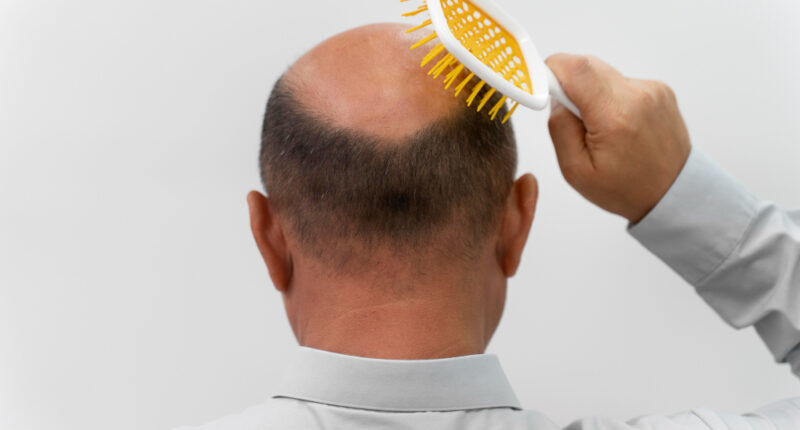“Millions of people around the world are dealing with the common issue of hair loss.”. While gradual thinning is typical as people age, rapid hair loss can be particularly alarming. Understanding the causes, prevention, and treatment options for rapid hair loss is crucial in managing this condition effectively.
Understanding Rapid Hair Loss
Rapid hair loss, or telogen effluvium, occurs when hair sheds at an accelerated rate. Unlike gradual thinning, this type of hair loss is noticeable and can be distressing.
Common Causes of Rapid Hair Loss
- Stress: Physical or emotional stress can trigger rapid hair loss. This includes significant life changes, trauma, or prolonged periods of anxiety and depression.
- Hormonal Changes: Fluctuations in hormone levels due to pregnancy, childbirth, menopause, or thyroid issues can lead to sudden hair loss.
- Nutritional Deficiencies: Lack of essential nutrients, such as iron, zinc, and vitamins A, D, and E, can weaken hair and cause it to fall out.
- Medications: Certain drugs, including chemotherapy, anticoagulants, and antidepressants, are known to cause hair loss as a side effect.
- Medical Conditions: Autoimmune diseases, scalp infections, and chronic illnesses can contribute to rapid hair shedding.
- Genetic Factors: A family history of hair loss can predispose individuals to similar issues, often exacerbated by environmental factors.
Preventing Rapid Hair Loss
Prevention strategies for rapid hair loss involve lifestyle adjustments and proactive measures to maintain hair health:
- Balanced Diet: Ensure your diet is rich in essential nutrients. Foods high in vitamins, minerals, and proteins support hair growth and strength.
- Stress Management: Try incorporating stress-reducing activities into your routine, like meditation, yoga, or regular exercise. Proper stress management can significantly impact hair health.
- Gentle Hair Care: Avoid harsh hair treatments and styling products. Use a mild shampoo and conditioner suitable for your hair type, and minimize the use of heat styling tools.
- Regular Scalp Care: Keep your scalp clean and healthy. Don’t forget the following tip: Massage your scalp regularly to boost blood circulation and encourage healthy hair growth.
- Hydration: To maintain strong and healthy hair, it’s important to keep your hair and scalp hydrated. Drinking plenty of water is essential for this, so be sure to stay well-hydrated to support the strength of your hair.

Treatment Options for Rapid Hair Loss
If you are experiencing rapid hair loss, several treatment options are available, ranging from medical interventions to natural remedies:
- Medications: Over-the-counter and prescription medications like minoxidil (Rogaine) and finasteride (Propecia) can help stimulate hair growth and slow down hair loss.
- Hair Transplants: For severe cases, hair transplant surgery may be an option. This amazing procedure takes hair follicles from areas with plenty of hair and transfers them to areas where hair is thinning or bald, resulting in natural-looking and long-lasting results.
- Laser Therapy: Low-level laser therapy (LLLT) can stimulate hair growth by increasing blood flow to the scalp and energizing hair follicles.
- Natural Remedies: Essential oils such as rosemary, peppermint, and lavender can promote hair growth. These oils can be massaged into the scalp to improve blood circulation.
- Nutritional Supplements: Supplements containing biotin, keratin, and other essential vitamins can support hair health and reduce shedding.
When to Seek Professional Help
While some hair loss can be managed with lifestyle changes and over-the-counter treatments, it’s important to seek professional help if you notice:
- Sudden, patchy hair loss
- Excessive shedding that lasts for more than a few months
- Scalp irritation, redness, or discomfort
- Significant thinning that affects your self-esteem or quality of life
A dermatologist or a trichologist can provide a comprehensive evaluation and develop a personalized treatment plan to address your hair loss effectively.
Conclusion
Rapid hair loss can be a distressing experience, but understanding its causes, prevention strategies, and treatment options can help you manage this condition effectively. By maintaining a healthy lifestyle, caring for your scalp, and seeking professional advice when needed, you can mitigate the impact of rapid hair loss and promote healthier, stronger hair.









